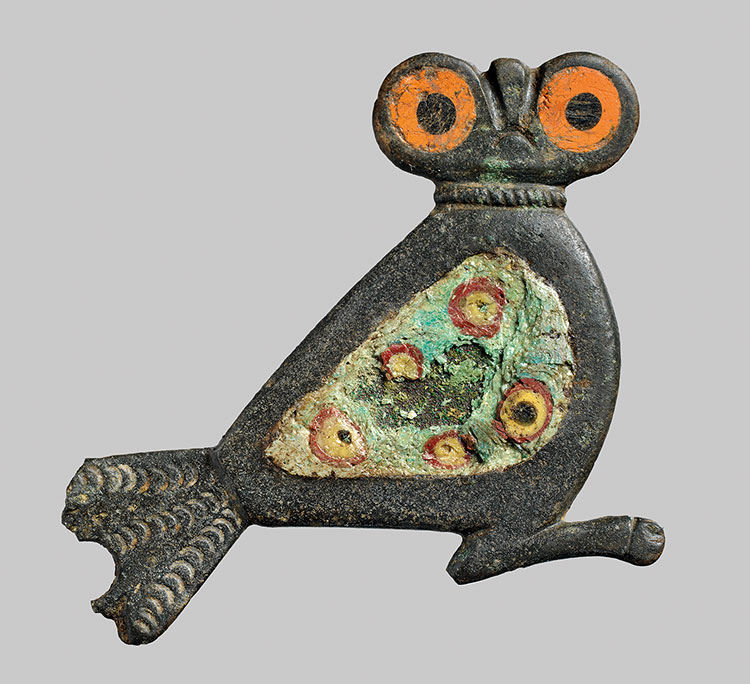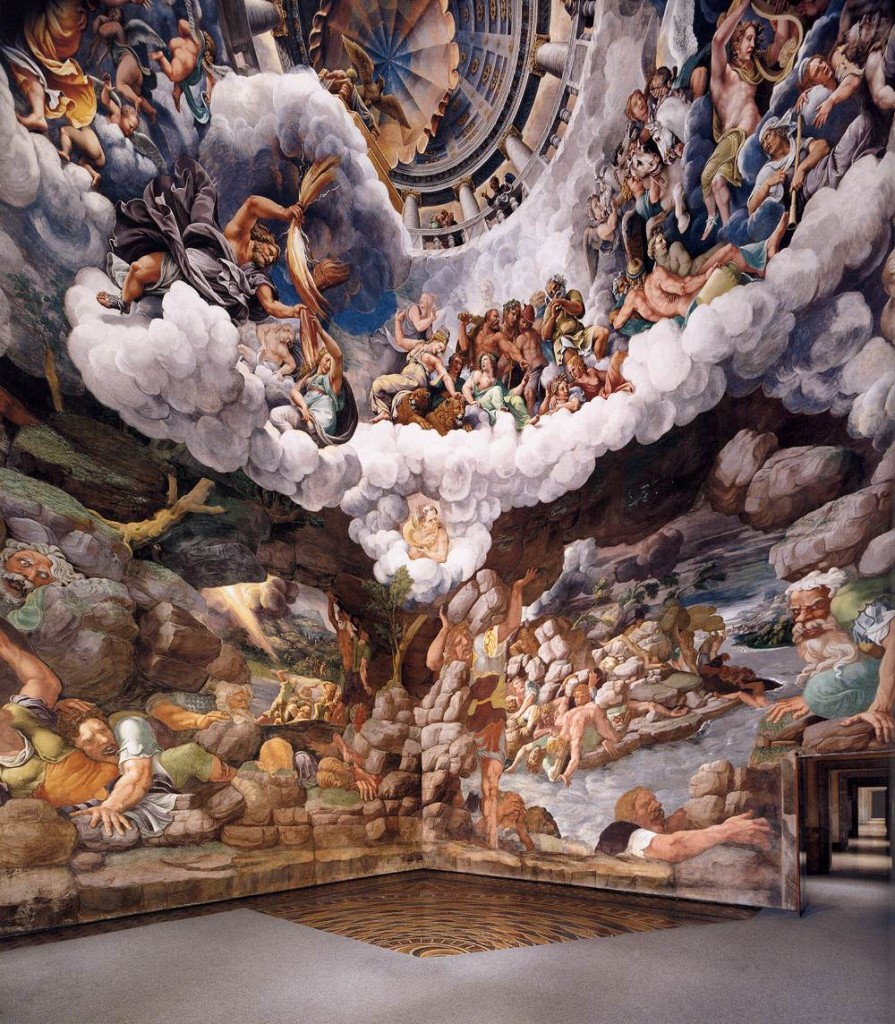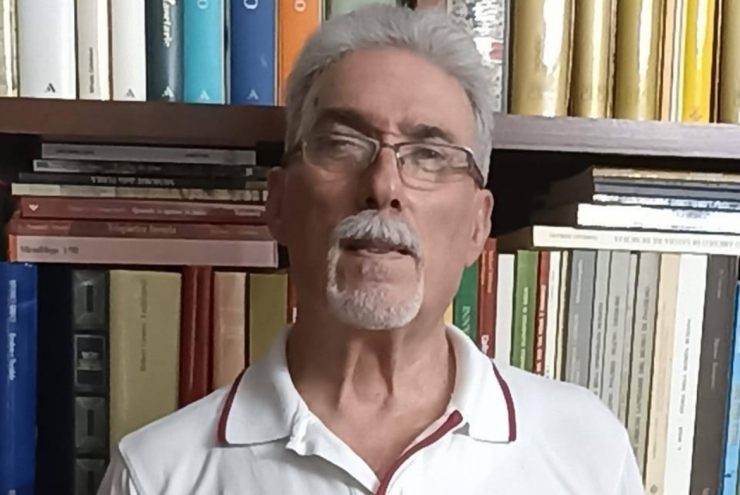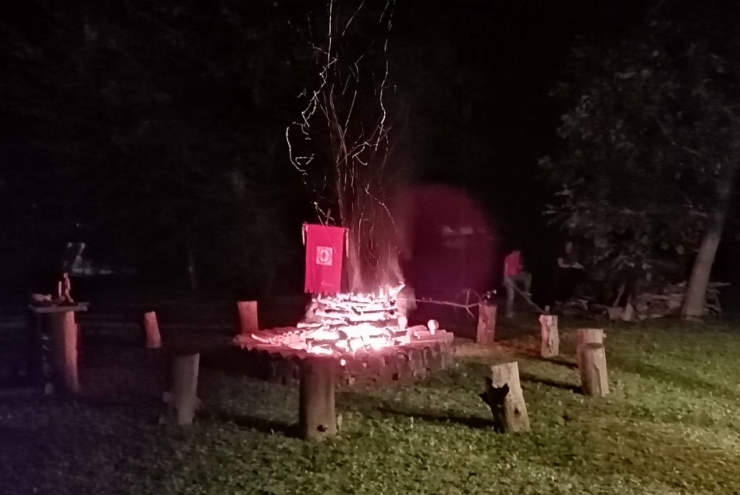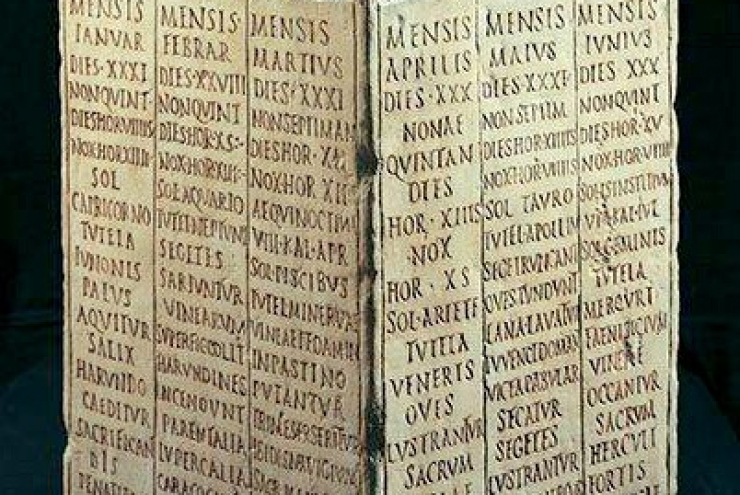Metamorphoses by Ovid. I, 113-150: The Fall
I, 113-124 “Dē aetāte argenteā”
- Postquam Sāturnō tenebrōsa in Tartara missō
sub Iove mundus erat, subiit argentea prōlēs
- aurō dēterior, fulvō pretiōsior aere.
Iuppiter antīquī contraxit tempora vēris,
perque hiemēs aestusque et inaequālīs autumnōs
et breve vēr spatiīs exēgit quattuor annum.
Tum prīmum siccīs āēr fervōribus ustus
- canduit, et ventīs glaciēs adstricta pependit;
tum prīmum subiēre domōs: domus antra fuērunt
et densī fruticēs et vinctae cortice virgae;
sēmina tum prīmum longīs cereālia sulcīs
obruta sunt, pressīque iugō gemuēre iuvencī.
I, 125-150 “Dē aetāte aenēā et ferreā”
- Tertia post illam successit aenea prōlēs,
saevior ingeniīs et ad horrida promptior arma,
non scelerāta tamen: dē dūrō est ultima ferrō.
Prōtinus inrūpit vēnae peiōris in aevum
omne nefas, fūgēre pudor vērumque fidēsque;
- in quōrum subiēre locum fraudesque dolīque
insidiaeque et vīs et amor scelerātus habendī.
Vela dabat ventīs nec adhūc bene nōverat illōs
nāvita, quaeque diū steterant in montibus altīs,
fluctibus ignōtīs insultavēre carīnae,
- commūnemque prius ceu lūmina sōlis et aurās
cautus humum longō signāvit līmite mensor.
Nec tantum segetēs alimentaque dēbita dīves
poscēbātur humus, sed itum est in viscera terrae,
quāsque recondiderat Stygiīsque admōverat umbrīs,
- effodiuntur opes, inrītāmenta malōrum;
iamque nocens ferrum ferrōque nocentius aurum
prōdierat: prōdit bellum, quod pugnat utrōque,
sanguineāque manū crepitantia concutit arma.
Vīvitur ex raptō; nōn hospes ab hospite tūtus,
- nōn socer ā generō, fratrum quoque grātia rāra est.
Inminet exitiō vīr coniugis, illa marītī;
lūrida terribiles miscent aconīta novercae;
filius ante diem patriōs inquīrit in annōs.
Victa iacet pietās, et Vīrgō caede madentes,
- ultima caelestum, terrās Astraea relīquit.
Translation
The Silver Age
After the world passed under Jupiter, following the imprisonment of Saturn in the dark Tartarus, the generation of silver arose, worse than gold but better than blond bronze. Jupiter shortened the duration of the ancient spring and divided the year into four different parts: winter, summer, autumn and spring. So for the first time, the air burned with dry heat and the hard ice remained suspended from the winds. For the first time they built shelters: the houses were caves and dense bushes and rods tied with a bark; for the first time the seeds of the cereals were sown in long furrows and the bullocks, loaded with the yoke, began to moan.
The Age of Bronze and the Age of Iron
The third generation was succeeded by that generation of bronze, of a crueler nature and more prone to cursed weapons, but not totally villainous: then the last generation of hard iron appeared. Immediately every impiety broke out in the age of the worst metal and fled the modesty, the truth and the trust; in their place appeared fraud, malice, insidiousness, violence and nefarious love. The sailor gave the sails to the winds without even knowing them well, and the keels of the boats that had long stood high in the mountains defied the unknown waves, and the watchful gauge bounded the land that was once in common as the light of the sun or the air.
Not only the necessary fields and food were claimed from the rich soil, but they proceeded to the bowels of the earth and dug out the precious metals, the cause of the evil, which the earth had hidden by placing them among the shadows of the Styx.
By now the harmful iron and the gold were advancing, even more damaging than iron: the war appeared, fighting for both and shaking its crackling arms with bloody hands. There was a life of robbery, the guest was not sure with the host, nor the son-in-law with the father-in-law, the harmony between brothers was a rare thing. The husband threatened his wife with death, and she her husband; terrible stepmothers prepared horrible poisons; the son investigated ahead of time how many years his father would still live.
Mercy lies defeated, and Astrea the virgin, the last celestial being, full of blood of the slaughter, leaves the earth.
Comment
The fall of mankind is a recurring theme in different traditions. Ovid, who uses a lot of material from Hesiod, does not explain a particular reason nor a single negative act, but describes a gradual subversion of the cosmic and primitive ethical order. The formation of the world takes place by ordering chaos, its destruction occurs by returning to chaos. The primordial chaos, however, was an informal conglomerate with enormous potential, which received the perfection of the forms to give life to the cosmos, while the new chaos is mainly ethical, representing the inability of the human being to stop the process of differentiation from the top towards the bass. Man, inebriated by his power, plays with his power forgetting ethics and generating new situations towards “the bottom”, rather than realizing that he is a repository of divine action “from above” and seeking perfection of the forms from which one’s thought derives. Man’s true nature in origin had been described as “in effigiem deōrum moderantum cuncta” in the image of the Gods who govern everything. Human beings, abandoning their capacity to govern the world and to support the universe as collaborators of divine action, fall into a gapless chasm.
Turning more in detail to the text, we note that while it is true that in this section the Greek myth of Saturn is chosen over the Italic narration, on the other hand, the silence of Ovid on the gruesome details of the myth is certainly intentional. The entire myth of the bloody dethronement of Cronus is synthesized in less than one verse using an absolute ablative “Sāturnō tenebrōsa in Tartara missō”, as if it were a note in brackets. In fact it is difficult to imagine that the ruler of a happy time, the one who ruled Saturnia Tellus, the one who had given the Golden Age to men, was a cruel sovereign: simply the myth of the Golden Age under Saturn is not consistent with the narration of the cruel facts related to the dethronement, necessitating a narrative simplification to silence the great contradiction.
Philosophically, Saturn represents the place beyond the multiplicity of ideas, a place that every soul must go through in the process of incarnation, before plunging into the multiplicity of ideas. Time is born with Saturn, which is not yet divided as it is prior to ideas, but rather manifests itself as a continuous spring. With Jupiter, the universe takes shape as we know it, based on the discernment of ideas. Here is how time is measured and divided into cycles and seasons.
In the age of silver the differences that were previously present only in power are manifested: heat and cold appear and man begins to think and find solutions by looking for and building shelters and inventing agriculture.
Ovid does not explain the reason for the deterioration of age but describes it effectively as a matter of fact. Now the dynamics are in motion, and after a few verses the age of silver is ousted from that of the bronze, where cruelty appears, even if one understands that this was already present in the previous age, but now it is stronger. The acceleration of the author is brilliant making us fall into the nightmare of the Iron Age.
Every virtue is abandoned, with a cosmic subversion of the natural order. Now the trunks of the trees, which were born in the mountains, challenge the seas, in refined contrast with verses 94-95 where for the Golden Age it was affirmed: “the pinewood did not descend in the clear waves to see the world, after being cut from his mountains”.
The exploitation of the planet in search of profit (because gold is as harmful as iron) is described in a very effective way by the image of the excavations of the riches in the bowels of the earth up to the Styx. The greed has only one outlet: the impiety that leads to the destruction of the world itself.
How much bitterness and sadness in reading family quarrels, threats of death between wife and husband, children waiting for the death of their fathers to take the legacy, failure to respect the principle of hospitality dear to Jupiter.
In this scenario that is antithetical to the order of formation of the world, Justice, played by Astrea, daughter of Astreus and Eos (Aurora), bathed in the blood of wars, abandons the world, finding a new place in the constellation of the Virgin.
So the thought turns to the path of the hero, the wise man, the philosopher, the guide: only the reference to an immortal, eternal, divine, noumenal ethics, can allow us to go back and participate in the divine work of the world, opposing us to the nihilist chaos.
Mario Basile
Fori Hadriani scripsit, III Kal. Apr. MMDCCLXXII


